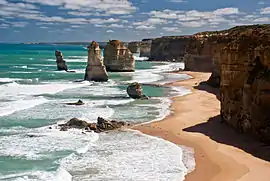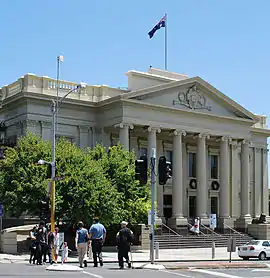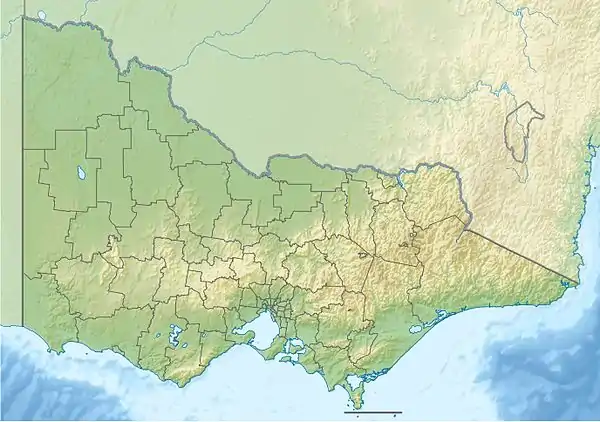Barwon South West
The Barwon South West is an economic rural region[1] located in the southwestern part of Victoria, Australia.[2] The Barwon South West region stretches from the tip of the Queenscliff Heads to the border of South Australia. It is home to Victoria’s largest provincial centre, Geelong and the major centres of Aireys Inlet, Apollo Bay, Camperdown, Colac, Hamilton, Lorne, Port Campbell, Port Fairy, Portland, Torquay and Warrnambool. It draws its name from the Barwon River and the geographic location of the region in the state of Victoria.
| Barwon South West Region Victoria | |||||||||||||||
|---|---|---|---|---|---|---|---|---|---|---|---|---|---|---|---|
 The Twelve Apostles on the southwest boundary of the region. | |||||||||||||||
 Town Hall in Geelong, the major urban centre of the region. | |||||||||||||||
 Barwon South West Region The location of Warrnambool, a city in the Barwon South West region | |||||||||||||||
| Coordinates | 38°23′S 142°29′E | ||||||||||||||
| Population | 360,384 (2011 census)[Note 1] | ||||||||||||||
| • Density | 12.36478/km2 (32.0246/sq mi) | ||||||||||||||
| Area | 29,146 km2 (11,253.3 sq mi)[Note 2] | ||||||||||||||
| LGA(s) | |||||||||||||||
| State electorate(s) | |||||||||||||||
| Federal Division(s) | |||||||||||||||
| Website | Barwon South West Region | ||||||||||||||
| |||||||||||||||
Comprising an area in excess of 40,000 square kilometres (15,000 sq mi) with approximately 360,000 residents as at the 2011 census, the Barwon South West region includes the Colac Otway, Corangamite, Glenelg, Greater Geelong, Moyne, Queenscliffe, Southern Grampians, Surf Coast and Warrnambool City local government areas and the Unincorporated area of Lady Julia Percy Island.
The Barwon South West region is located along the two major interstate transport corridors – the Princes Highway corridor and the Western Highway corridor. The region comprises two distinct and inter-connected sub-regions or districts: Greater Geelong and the Great South Coast. The region is bounded by Bass Strait and the Great Australian Bight in the south and southwest, the South Australian border in the west, the Grampians region in the north and the Greater Melbourne region in the east.[3]
Administration
Political representation
For the purposes of Australian federal elections for the House of Representatives, the Barwon South West region is contained within all or part of the electoral divisions of Corangamite,[4] Corio,[5] and Wannon.[6]
For the purposes of Victorian elections for the Legislative Assembly, the Barwon South West region is contained within all or part of the electoral districts of Bellarine, Geelong, Lara, Lowan, Polwarth, Ripon, South Barwon, and South-West Coast.
Local government areas
The region contains nine local government areas and one unincorporated area of Victoria, which are:
| Local government area | Area | Population (2011 census) |
Source(s) | |
|---|---|---|---|---|
| km2 | sq mi | |||
| Shire of Colac Otway | 3,433 | 1,325 | 20,345 | [7] |
| Shire of Corangamite | 4,407 | 1,702 | 16,376 | [8] |
| Shire of Glenelg | 6,212 | 2,398 | 19,575 | [9] |
| City of Greater Geelong | 1,247 | 481 | 210,875 | [10] |
| Shire of Moyne | 5,478 | 2,115 | 15,955 | [11] |
| Borough of Queenscliffe | 36 | 14 | 3,000 | [12] |
| Shire of Southern Grampians | 6,652 | 2,568 | 16,359 | [13] |
| Surf Coast Shire | 1,560 | 600 | 25,870 | [14] |
| City of Warrnambool | 121 | 47 | 32,029 | [15] |
| Totals | 29,146 | 11,253 | 360,384 | |
Environmental protection
The Barwon South West region contains the Brisbane Ranges, Cobboboonee, Great Otway, Lower Glenelg and Port Campbell national parks.
Notes
- Population figure is the combined population of all LGAs in the region
- Area figure is the combined population of all LGAs in the region
References
- "Meaning of Regional Victoria". Department of State Development, Business and Innovation (MS Word requires download). State Government of Victoria. 2011. Archived from the original on 19 August 2014. Retrieved 15 August 2014.
- "Victoria's Barwon South West Region". Regional Development Victoria. State Government of Victoria. 8 May 2014. Retrieved 10 August 2014.
- "Great South Coast Regional Growth Plan: Summary" (PDF). Department of Transport, Planning and Local Infrastructure (PDF). Government of Victoria. May 2014. p. 11. Archived from the original (PDF) on 19 August 2014. Retrieved 16 August 2014.
- "Profile of the electoral division of Corangamite (Vic)". Current federal electoral divisions. Australian Electoral Commission. 24 December 2010. Retrieved 16 August 2014.
- "Profile of the electoral division of Corio (Vic)". Current federal electoral divisions. Australian Electoral Commission. 24 December 2010. Retrieved 16 August 2014.
- "Profile of the electoral division of Wannon (Vic)". Current federal electoral divisions. Australian Electoral Commission. 24 December 2010. Retrieved 15 August 2014.
- Australian Bureau of Statistics (31 October 2012). "2011 Community Profiles: Colac Otway (S) (Local Government Area)". 2011 Census of Population and Housing. Retrieved 15 August 2014.

- Australian Bureau of Statistics (31 October 2012). "2011 Community Profiles: Corangamite (S) (Local Government Area)". 2011 Census of Population and Housing. Retrieved 15 August 2014.

- Australian Bureau of Statistics (31 October 2012). "2011 Community Profiles: Glenelg (S) (Local Government Area)". 2011 Census of Population and Housing. Retrieved 15 August 2014.

- Australian Bureau of Statistics (31 October 2012). "2011 Community Profiles: Greater Geelong (C) (Local Government Area)". 2011 Census of Population and Housing. Retrieved 15 August 2014.

- Australian Bureau of Statistics (31 October 2012). "2011 Community Profiles: Moyne (S) (Local Government Area)". 2011 Census of Population and Housing. Retrieved 15 August 2014.

- Australian Bureau of Statistics (31 October 2012). "2011 Community Profiles: Queenscliffe (S) (Local Government Area)". 2011 Census of Population and Housing. Retrieved 15 August 2014.

- Australian Bureau of Statistics (31 October 2012). "2011 Community Profiles: Southern Grampians (S) (Local Government Area)". 2011 Census of Population and Housing. Retrieved 15 August 2014.

- Australian Bureau of Statistics (31 October 2012). "2011 Community Profiles: Surf Coast (S) (Local Government Area)". 2011 Census of Population and Housing. Retrieved 15 August 2014.

- Australian Bureau of Statistics (31 October 2012). "2011 Community Profiles: Warrnambool (C) (Local Government Area)". 2011 Census of Population and Housing. Retrieved 15 August 2014.

External links
- "Barwon South West region". Regional Development Victoria. Government of Victoria. 14 October 2013.